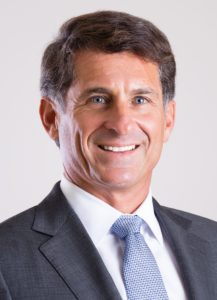StepStone Real Estate has hired Frank Forster to lead its property investments in Europe as the New York-based private markets firm seeks to invest $3.5 billion in the asset class globally, PERE has learned.
Forster, who joined StepStone this month, will be based in the firm’s London office and report to head of EMEA Josh Cleveland and head of investments John Waters. He previously worked at the real estate arm of Swedish private equity firm EQT as director of Germany for more than five years and was one of the initial hires for the platform. Prior to that, he was a director at Mount Kellett Capital Management for two years and a principal at Blackstone for eight years, according to his LinkedIn profile.
As managing director, Forster will be charged with sourcing, executing and managing investments primarily for StepStone’s co-investments, secondaries and recapitalization programs, which together comprise its active investments business. The firm also makes investments in real estate funds and separately managed accounts on a non-discretionary basis.
Forster will help to oversee the European investments team, which encompasses 14 professionals in the region. StepStone Real Estate has approximately 45 people in its investment team globally.
“The opportunity in Europe is evolving and emerging with distress,” Jeff Giller, head of StepStone Real Estate, said in an interview with PERE. “After a year of prices and values holding with very little investment activity, we’re seeing now dislocation manifest in the market. We are seeing more interesting opportunities.”

StepStone has been particularly focused on the care home sector, which has held up relatively well as a result of continuing demand and government support, despite the operational and occupancy challenges that have come with the pandemic.
“We think in the UK, the pendulum may have swung too far in terms of pricing diminution following Brexit and covid shock. We think the UK could present really strong buying opportunities,” said Giller. Meanwhile, the firm also has been examining the student housing and other sectors across Europe.
However, “much of what we do is based upon our position in the capital stack,” Giller added. “We structure a lot of our investments as preferred equity or debt. Given the issues in banks, the distress in traditional lenders with risk-based capital reserve requirements, we’ve seen private debt opportunities really emerge.”
Forster is one of nine new hires StepStone’s real estate business has made in the US and Europe within the past six months to bolster the deployment of $3.5 billion of dry powder in secondaries, recapitalizations and co-investments in the post-covid real estate market and to expand its advisory service capabilities.
In addition to Forster, Stepstone added Margaret McKnight, formerly the chief investment officer and co-head of the Americas at Metropolitan Real Estate, as a partner in December. The firm plans to hire additional investment professionals in the coming year to bring its investment team to around 50 professionals across the US, Europe and Asia, according to Giller. Aside from Forster and McKnight, the new staff will be at the associate to vice-president levels.
StepStone’s $3.5 billion in dry powder comes from a combination of StepStone Real Estate Partners IV, the $1.4 billion GP-led secondaries and recapitalization-focused fund that was closed last September; another approximately $1 billion of separate account capital raised last year; and unfunded commitments from funds and separate accounts raised in 2018 and 2019.
The firm closed on its first real estate investment in more than a year in mid-February, a co-investment in a Class A industrial portfolio in Japan leased to high-credit tenants, and intends to be more active in Asia going forward. “Over the last five years, we have underweighted Asia largely because of the opacity and some of the risks, including political risk, liquidity challenges and also the currency volatility and the cost of hedging have challenged returns,” Giller said.
Over the past decade, StepStone has invested a relatively small amount of its discretionary capital outside of the US and Europe, with its property portfolio roughly split between both regions. “In Europe, maybe because of the fragmentation, we’ve found more dislocation there, whereas the US fills the more stable bucket of our allocation,” Giller added. “We’re looking at tilting more to Asia as those economies seem to be recovering more rapidly than the US and Europe. We expect to be leaning there more than we had before.”
StepStone is currently conducting due diligence on more than $900 million in investments globally, of which approximately 45 percent is in Europe, 45 percent in the US and 10 percent Asia. The pipeline allocation “is roughly in line with our allocation objectives,” Giller said.
In terms of deployment pace, Giller said its investment activity has already increased significantly compared with last year and should become more robust during the third and fourth quarters of the year. However, “we expect the preponderance will go out in 2022 and 2023.”


 If you do not receive this within five minutes, please try to sign in again. If the problem persists, please email:
If you do not receive this within five minutes, please try to sign in again. If the problem persists, please email: 

